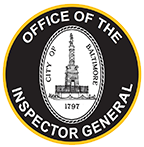

Listed below you'll find the definitions for various allegations, which the OIG can review and investigate, along with definitions of other relevant terms:
Abuse of Power: Making excessive or improper decisions, choices, or appointments because one's authority allows them to do so.
Background Investigation: False information provided or failure to disclose information in connection with an employee background investigation.
Bribery: The offering, giving, receiving, or soliciting of something of value for the purpose of influencing an action or the discharge of official duties.
Confidentiality: Person(s) who contact the Hotlinemay request confidentiality and can be assured that their identities are generally not revealed. However, your identity may be revealed if it is the only way to effectively investigate the alleged matter or as otherwise required by law.
Conflict of Interest: A clash between City interests and the private interest of a City employee that may influence that employee's performance of duty.
Contract Fraud: Fraud in connection with City contacts or committed by City contractors, such as making false statements or false claims, or failing to adequately perform or deliver on a City contract.
Embezzlement: The fraudulent appropriation of City property or funds by one lawfully entrusted with its possession.
False Claim: A claim that contains information that is not true, such as certifying delivery when no delivery has been made.
False Statement: Statements made to the City or an agency of the City that is knowingly false, or made recklessly without an honest belief in its truth, and with a purpose to mislead or deceive.
Falsifying Official Documents: To counterfeit, forge, mutilate, alter, make additions to, or tamper with an official City form or document.
Favoritism: Preference and selection based on friendship and factors other than merit.
Fraud: A false representation of a matter of fact, whether by words or by conduct, by false or misleading allegations, or by concealment of a fact which should have been disclosed, which deceives and is intended to deceive another so that they rely on it to their injury. Such practices include – but are not limited to – the offer, payment, or acceptance of bribes or gratuities; making false statements; submitting false claims; falsifying records and books of accounts; arranging for secret profits, kickbacks, or commissions; and conspiring to take any of the aforementioned actions.
Kickback: An amount of money (or goods or services) that a contractor provides to a City employee, in exchange for the employee improperly securing a contract for the contractor.
Misconduct: The intentional or improper use of government resources, including abuse of power or the misuse of resources such as tools, vehicles, or office equipment.
Mismanagement: A collective term covering acts of waste and abuse. Extravagant, careless, or needless expenditure of Government funds or the consumption or misuse of Government property or resources, resulting from deficient practices, systems, controls, or decisions.
Misuse or Diversion of City Property: Unauthorized use of City property – including computer equipment and vehicles – or use of such property that exceeds the scope of official City business.
Misuse of funds or credit cards: Unauthorized or inappropriate distribution of City funds or credit cards.
Operational Issues: Problems at City agencies that have an adverse effect on operations.
Workers' compensation Fraud: Fraud committed by a City employee in connection with his or her Workers' Compensation claim.
Theft: The act of stealing or taking City property without consent or authorization. This can include computer equipment, City purchase cards, and supplies.
Timekeeping or Payroll complaints: Complaints involving timekeeping and payroll issues.
Travel Claims Fraud: Allegation that the City paid inappropriate or fraudulent travel claims submitted by a City employee.
Waste: The extravagant, careless, or needless expenditure of Government funds, or the consumption of Government property that results from deficient practices, systems, controls, or decisions.
Whistleblower Reprisal: Taking or failing to take a personnel action against an employee or applicant in retaliation after that individual has made a complaint or disclosed information that the employee or applicant reasonably believes evidence: (1) a violation of any law, rule, or regulation; (2) gross mismanagement; (3) a gross waste of funds; or (4) an abuse of power. For example, after an employee reported the fraud to the OIG, the employee's supervisor issued the employee a Letter of Warning.